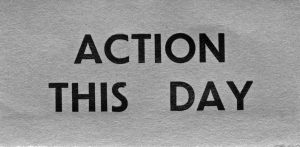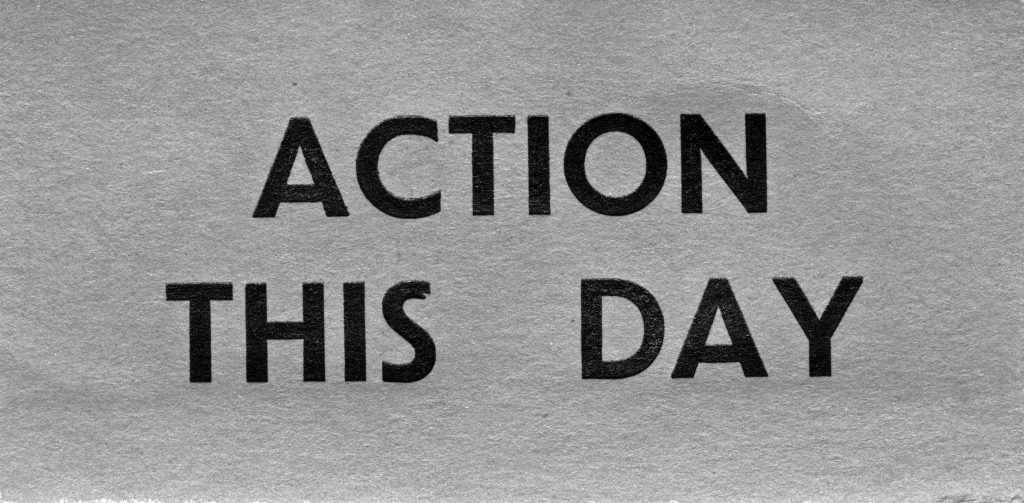
Finest Hour 183
Action This Day – Winter 1894, 1919, 944

May 17, 2019
Finest Hour 183, First Quarter 2019
Page 38
By Michael McMenamin
125 Years ago
Winter 1894 • Age 19
“Keep Down the Smoking”
With graduation from Sandhurst pending, Winston began to consider his future service in the Army. On 11 January, he wrote to his mother and listed five reasons why he preferred a cavalry regiment rather than an infantry regiment. First, promotions came faster in the Cavalry than in the Infantry. Second, commissions also came “much sooner” in the Cavalry. Third, the 4th Hussars were going to India, and, if he joined the regiment before it left, he “would have 6 or 7 subalterns below me in a very short time.” Fourth, Cavalry regiments were “always given good stations in India and generally taken great care of by the Government,” whereas the Infantry “have to take what they can get.” Fifth, keeping a horse was much cheaper in the Cavalry, because the government provided stabling, forage, and labor.
Winston had also listed these same reasons in a letter to his mother’s friend, Colonel Brabazon of the 4th Hussars. In the letter to his mother, he added a sixth reason that included more attractive uniforms, the advantages of riding over walking, as well as being in a regiment where his mother knew some of the officers.
Though unknown to them both, Winston’s father had less than a year to live. Lord Randolph’s attitude towards his son, however, continued to be more positive than it had been previously. On 10 February, he wrote to Winston praising him for his work at Sandhurst and expressing the hope that he “will do better this quarter even than you did the last. They say a good beginning makes a good ending. But you must keep the standard up and keep raising.” Lord Randolph concluded the letter with the paternal admonition to “take care of your health. Keep down the smoking, keep down the drink & go to bed as early as you can. Well I have written you a regular lecture but it is all sound. The better you do the more I shall be inclined to help you.
100 Years ago
Winter 1919 • Age 44
“It Was One of the Best Things I Did”
Churchill was formally appointed Secretary of State for War and Air on 9 January and was immediately faced with two very large problems. One was what to do with the 14,000 British troops in Russia supporting anti-Bolshevik forces in the Civil War. Of more immediacy, however, was the issue of how to go about demobilizing the Army in France without causing a mutiny among the troops.

2024 International Churchill Conference
Mutiny was a very real possibility. Angry troops had been demonstrating in London the previous two days protesting the unfair policy Churchill inherited from his predecessor, whereby only those soldiers who had offers of work at home could be demobilized. Within three days of taking office, Churchill solved the problem and diffused the situation with a new policy that allowed for the immediate demobilization of those who had served the longest, were the oldest, or had been wounded. Churchill later said: “It was one of the best things I did.”
By the end of January, nearly one million troops had returned home. Not everyone, however, was happy. A mutiny did develop among 5,000 troops who had been sent back to France from England prior to Churchill taking office. General Douglas Haig, the commanding officer, arrested the three ringleaders and told Churchill they had to be executed. Churchill refused because no blood had been shed or lives lost, and public opinion would not support executions under those conditions.
The problem of British troops in Russia was not so easily solved. Churchill had played no role in sending them there. After the Bolsheviks made peace with Imperial Germany in early 1918, Allied troops had been sent to Russian ports to deny access to them by the Germans. Once the war ended, however, neither Britain, France, nor the United States had a policy on what their troops should be doing, other than protecting the supplies originally intended for the Czar’s armies. By default, since the Allies had recognized the White Russian Government rather than the Bolsheviks, decisions were made by Allied commanders in the field to support the White Army against the Red. Churchill’s military advisers wanted to reinforce the troops. He was sympathetic and said in a telegram to Generals Ironside and Maynard: “What sort of a Peace (!) should we have if all Europe & Asia from Warsaw to Vladivostok were under the sway of Lenin?”
In the event, Prime Minister Lloyd George and the War Cabinet accepted Churchill’s advice to withdraw all British troops from Russia, except for those who volunteered to stay and fight the Bolsheviks. Additionally, the White Russian government would be furnished with money, arms, and supplies. Churchill had no illusions that this would be sufficient unless the Russians stood up to the Bolsheviks. “Russia must be saved,” he wrote, “by Russian exertions and it must come from the heart of the Russian people and with their strong arm that the conflict against Bolshevism in Russia must mainly be waged.”
When Churchill began to implement these decisions by resupplying the 2,000 British volunteers and anti-Bolshevik forces with arms and munitions, Lloyd George criticized the cost of doing so and called it “your,” i.e., Churchill’s, Russia Policy. Churchill promptly drafted—but did not send—an angry letter to Lloyd George: “You speak of my ‘Russia Policy.’ I have no Russia Policy. I know of no Russia Policy. I went to Paris to look for a Russia Policy. I deplore the lack of a Russia Policy…. All I am doing is carrying on from day-to-day, guided by such indications I receive from the War Cabinet, for whose decisions I naturally have no responsibility beyond my department duty…So far, I am not responsible for sending a single man to Russia.”
75 Years ago
Winter 1944 • Age 69
“I Am the Leader of a Strong, Unbeaten Nation”
Churchill was displeased in the winter of 1944 that the French and Polish governments in exile were acting as if their countries had not been defeated by Germany and were operating under the illusion that they could deal with the major Allied powers as equals, rather than as the supplicants they so obviously were. The Prime Minister believed he had far more pressing matters with which to contend, such as plans for the forthcoming landings at Anzio and Normandy.
Churchill was angry that the French government had arrested former Vichy officials in Algiers who had been working with the Allies. Harold Macmillan, the British resident minister, wanted his boss to meet de Gaulle, but Churchill refused. Then, as Macmillan wrote in his diary, “He took my hand in his in a most fatherly way and said: ‘Come and see me again before I leave Africa, and we’ll talk it over.’”
Macmillan eventually persuaded Churchill to meet de Gaulle: Churchill did so over lunch in Marrakesh on 12 January. At one point, an exasperated Prime Minister said to the French general: “Look here! I am the leader of a strong, unbeaten nation. Yet every morning I wake, my first thought is how can I please President Roosevelt and my second thought is how can I conciliate Marshal Stalin. Your situation is very different. Why then should your first waking thought be how you can snap your fingers at the British and Americans?” Nevertheless, despite the dressing down—or perhaps because of it—de Gaulle invited Churchill to review with him side-by side the French troops in Marrakesh the next morning.
If the French were a trial, the Poles were worse. Churchill wanted the Polish government in exile to accept the “Curzon Line” drawn up in 1919 for a Russo-Polish border, which the Germans and Russians had agreed in their 1939 pact would be their shared border after Poland had been occupied by both powers.
The Poles rejected this. They told Churchill that they wanted as a “reward for Polish suffering” to retain both their eastern provinces taken from Russia by the Versailles Treaty as well as those western provinces awarded them from Germany. As the Polish Prime Minister-in-exile said, Poland should at war’s end have “her eastern provinces intact and her western provinces [i.e., those in Germany] increased.”
The problem with this, as Churchill well knew, was that Poles had no army to bring this about. It had been defeated five years earlier as easily as the French army had been routed a year later. It is a myth, sadly repeated in Poland today, that Churchill “sold out” Poland at Yalta. In truth, Poland may have been the spark that ignited the Second World War, but neither Great Britain nor the United States was prepared or willing to engage the Soviet Union in a Third World War over the borders of Polish territory.
Meanwhile, the Anzio landings did not go so well as the Allies had planned. The beachhead was successfully established, but little effort was made to break out of it. Ten days later, Churchill acerbically observed: “I had hoped we were hurling a wildcat onto the shore, but all we had got was a stranded whale.”
Subscribe
WANT MORE?
Get the Churchill Bulletin delivered to your inbox once a month.


